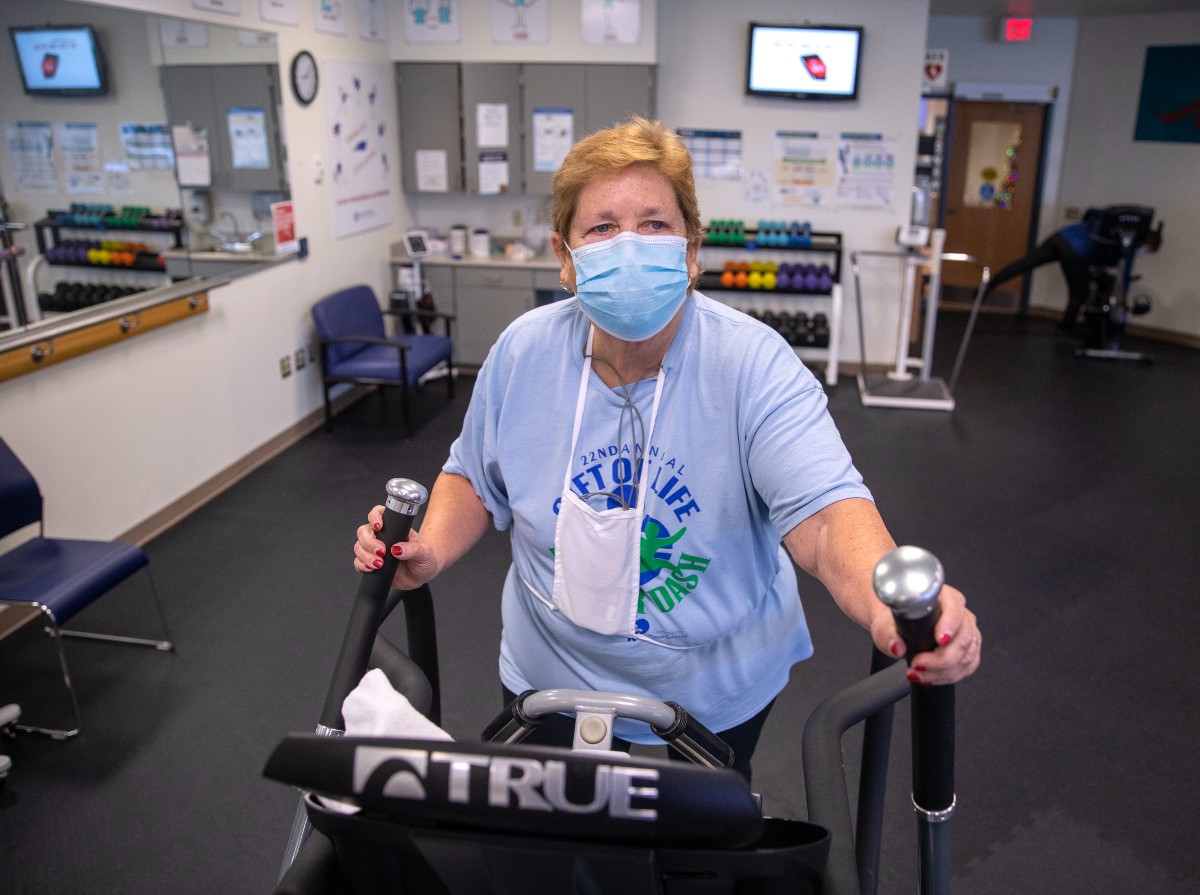Kathy’s journey from clinical research manager to clinical trial participant

Kathy Bradley was getting ready to go camping with her son and his family when a heart attack brought those plans to a halt.
What started out as a light pain in her back, turned into a sharp pain in her chest and jaw. After calling 911 and then her son, Bradley found herself in the emergency room at Penn State Health Milton S. Hershey Medical Center, hearing the reassuring voices of the staff who took care of her.
Bradley remembers waking up in the Intensive Care Unit (ICU), and asking her son, “did I really have a heart attack?”
During her recovery in the ICU, she met Krista Tarczynski, heart and vascular clinical research coordinator. Tarczynski helps identify patients who might be eligible for one of the more than 30 ongoing clinical trials at Penn State Heart and Vascular Institute.
“The research that is being done today has the potential to change care in the future,” Tarczynski said. “I enjoy talking with people about clinical trials and connecting them with research opportunities. I knew from the moment that I met Kathy though that there was something special about her.”
Role reversal
Tarczynski didn’t realize at first that Bradley used to do a job just like hers. For more than 25 years, Bradley, a retired registered nurse, was a clinical research manager in Thomas Jefferson University’s Department of Neuroscience.
“Working alongside physicians, scientists and our patients with neurological conditions was eye-opening,” Bradley recalled. “Some of the treatments and procedures we were evaluating decades ago are now among the standards of care for headaches, strokes, dementia, Alzheimer’s and other conditions.”
Tarczynski asked Bradley to consider participating in the Selatogrel Outcome Study in Suspected Acute Myocardial Infarction (SOS-AMI) trial. Participants in the trial carry an injection that they or a bystander can administer if and when they experience symptoms of a heart attack. Some randomly-assigned patients have a medication in the injection that might help break up blockages in the heart, while others receive a placebo that contains no medication. The participants and doctors have no knowledge about which group a patient is assigned to. This type of study, known as a double-blind, randomized, placebo‑controlled clinical trial, is a format that Bradley was familiar with from her days as a research manager.
“The study sounded interesting,” Bradley recalls. “But I still had some questions before participating. Mainly: If I have another heart attack and used the injection, would that change any of the care that I received to identify and treat a heart attack? I didn’t want that to affect my care.”
“Questions are encouraged and a normal part of the process,” Tarczynski said. “Before signing consent to participate in a trial, patients and families are given as much time as they need to ask questions. We do our best to provide them with as much information as possible so they can make an informed decision.”
Upon learning that participating in the trial would not affect her care should she have another heart attack, Bradley felt it was important to join the study.
“We were always grateful to the people who participated in our studies,” Bradley said. “Having an opportunity to participate in this trial is my way of giving back.”
While Milton S. Hershey Medical Center is one of many sites participating in the national clinical trial, it is one of only three sites in Pennsylvania. Ian Gilchrist, MD, professor of medicine at Penn State College of Medicine, is the principal investigator, or head of the research trial, at the Hershey Medical Center. The trial is also available at Penn State Health Medical Group – Berks Cardiology, where Ronald Polinsky, MD, is principal investigator.
“Penn State Health’s connection to the College of Medicine allows patients expanded access to leading-edge clinical trials across the region,” said Neal Thomas, MD, associate dean for clinical research at the College of Medicine. “Members of our communities don’t have to travel far to participate in groundbreaking clinical trials.”
On the road again
Kathy is back to doing what she loves – traveling. With kids and grandkids in the greater Philadelphia area, a sister in New Jersey, and nursing school friends from St. Agnes Hospital School of Nursing and Thomas Jefferson University, she hops on the road any chance she can get. But it wasn’t like that at first.
“I was afraid to even walk down the street,” Bradley admits. “But now I’m back to doing what I love – visiting family and friends and walking long distances.”
Bradley credits the exceptional care she received at Hershey Medical Center and the outstanding work of staff at the Penn State Health Cardiac Rehabilitation Program for helping her getting her back on her feet. And while she hopes she never has to use it, her injection is close at hand, should she have heart attack symptoms again.
“I’m proud to participate in this research and would encourage others to participate in a clinical trial if they are comfortable doing so,” Bradley said. “Your participation could help today’s investigative therapies potentially become tomorrow’s standards of care.”
READ MORE INFORMATION ABOUT THE SOS-AMI TRIAL
LEARN MORE ABOUT HEART AND VASCULAR INSTITUTE CLINICAL TRIALS
This research is being conducted using funds from Idorsia Pharmaceuticals Ltd. This research utilizes Selatogrel provided by the aforementioned sponsor(s). The Pennsylvania State University does not endorse, promote or recommend Selatogrel or any other commercial product or service. The views and opinions expressed by the researchers do not necessarily reflect those of The Pennsylvania State University, and any use of the names and logos of The Pennsylvania State University or its personnel without prior written consent is prohibited.
If you're having trouble accessing this content, or would like it in another format, please email Penn State Health Marketing & Communications.
